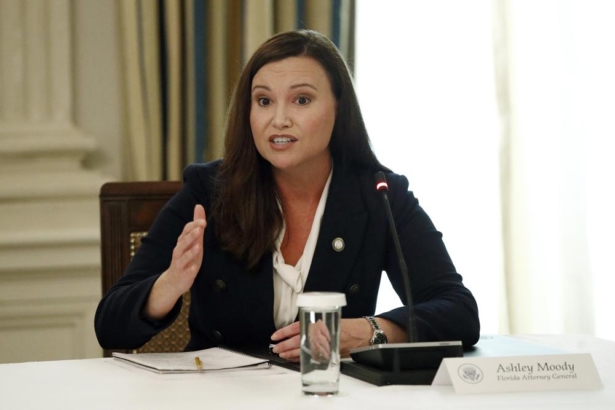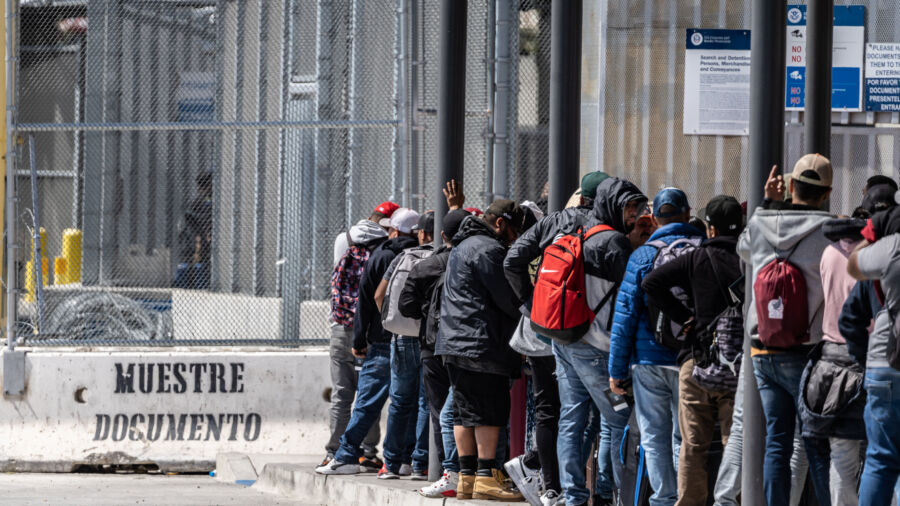The Biden administration on Friday asked a federal judge to resume the fast-track release of illegal immigrants in a court filing.
In a ruling in Florida v. United States (Case number: 23-cv-9962), U.S. Judge T. Kent Wetherell II, an appointee of former President Donald Trump, issued a temporary restraining order on Thursday night against the Biden administration’s new parole policy that would have replaced Title 42, the measure that allowed for the immediate expulsion of illegal border crossers to Mexico during the COVID-19 pandemic.
The policy titled “Policy on Parole with Conditions in Limited Circumstances Prior to the Issuance of a Charging Document” would release the illegal immigrants without a court date.
Instead, the illegal immigrants would schedule an appointment to appear at a U.S. Immigration and Customs Enforcement (ICE) facility online within 60 days or would get a Notice to Appear (NTA) via mail after being released.
Wetherell also blocked another U.S. Customs and Border Protection (CBP) parole known as “Parole + Alternatives to Detention (ATD)” in a separate case, Florida v. United States (Case number: 21-cv-01066) in early March.
The “Parole + ATD” policy allows CBP to release illegal immigrants into communities after national security and public safety evaluation.
Illegal immigrants who enrolled in the ATD program are subject to supervision, reads the CBP policy memorandum.
In the filing in the U.S. District Court in the Northern District of Florida, the Justice Department (DOJ) asked the judge to stay both orders and said they will appeal two rulings by the court by May 15 at the U.S. 11th Circuit Court.
“The Solicitor General has authorized an appeal of both orders and the government has filed a notice to appeal in 21-cv-01066 and will file a notice to appeal in 23-cv-9962, and intends to move to consolidate the two appeals,” the DOJ said. “Defendants advise the Court that they intend to seek emergency relief from the Eleventh Circuit by Monday, May 15, 2023, at 2:00 pm with respect to their requests to stay both orders if this Court does not grant the requested stays.”

Florida Attorney General Ashley Moody objected to the motion, saying that the Biden administration is trying to continue the “unlawful policy.”
“Let us be clear about what has apparently happened since. The federal government has known for some time that it intended to end Title 42 and induce a massive increase in the inflow of unlawful migrants at the border, thus exacerbating a border crisis that its own policies created. Part of its master plan to address that latest escalation of its own border crisis was apparently to reimpose much the same unlawful policy that this Court previously held unlawful—all without seeking a stay of the policy—apparently counting on the fact that no one would catch wind of what it was up too,” Moody responded in a court filing.
A Peek Into the Southern Border Crisis
The DOJ’s filing came with a statement from Matthew J. Hudak—deputy chief of the U.S. Border Patrol—which offers a peek into the southern border crisis.
U.S. Border Patrol (USBP) held more than 27,000 noncitizens in custody as of May 9.
It has encountered approximately 1.33 million noncitizens during fiscal year 2023 to date.
Days before Title 42 expired, USBP apprehended over 23,000 illegal immigrants per day on average between May 8 and 10.
“Over the last week, the ten-day average encounters is 9,087, with May 8, 9, 10 and all surpassing 10,000 apprehensions with a daily in custody average of 23,646,” Hudak stated.
The number of encounters per day is expected to increase to 12,000–14,000 after the termination of Title 42, he said.
The Biden administration is sending 1,500 troops to the southern border to deal with the expected surge of illegal immigrants.
Pentagon press secretary Gen. Pat Ryder confirmed in early May that the Pentagon would be sending 1,500 U.S. military personnel “to supplement” Border Patrol resources for 90 days.
Ryder suggested this could be extended as the need arises.
These 1,500 troops “will fill critical capability gaps, such as ground-based detection and monitoring, data entry, and warehouse support until CBP can address these needs through contracted support.”
“Military personnel will not directly participate in law enforcement activities,” Ryder added.
While the first wave of troops will be drawn from active-duty personnel, Ryder said that the Pentagon was looking into other options, including potentially pulling from reserves.
Joseph Lord and Caden Pearson contributed to the report.
From The Epoch Times

